PHP is a popular open-source server-side scripting language that is integral in developing dynamic web pages. PHP 8.0 is finally out and was released on November 26th, 2020. It promises lots of improvements and optimizations which are set to streamline how developers write and interact with PHP code.
In this guide, you will learn how to install PHP 8.0 on CentOS 8/7 and RHEL 8/7.
Step 1: Enable EPEL and Remi Repository on CentOS/RHEL
Right off the bat, you need to enable the EPEL repository on your system. EPEL, short for Extra Packages for Enterprise Linux, is an effort from the Fedora team that provides a set of additional packages that are not present by default on RHEL & CentOS.
$ sudo dnf install -y https://dl.fedoraproject.org/pub/epel/epel-release-latest-8.noarch.rpm [On CentOS/RHEL 8] $ sudo yum install -y https://dl.fedoraproject.org/pub/epel/epel-release-latest-7.noarch.rpm [On CentOS/RHEL 7]
Remi repository is a third-party repository that provides a wide range of PHP versions for RedHat Enterprise Linux. To install the Remi repository, run the command:
$ sudo dnf install -y https://rpms.remirepo.net/enterprise/remi-release-8.rpm [On CentOS/RHEL 8] $ sudo yum install -y https://rpms.remirepo.net/enterprise/remi-release-7.rpm [On CentOS/RHEL 7]
Step 2: Install PHP 8 on CentOS/RHEL
Once the installation is complete, proceed and list the available php module streams as shown:
$ sudo dnf module list php [On RHEL 8]
Right at the bottom, be sure to notice the remi-8.0 php module.
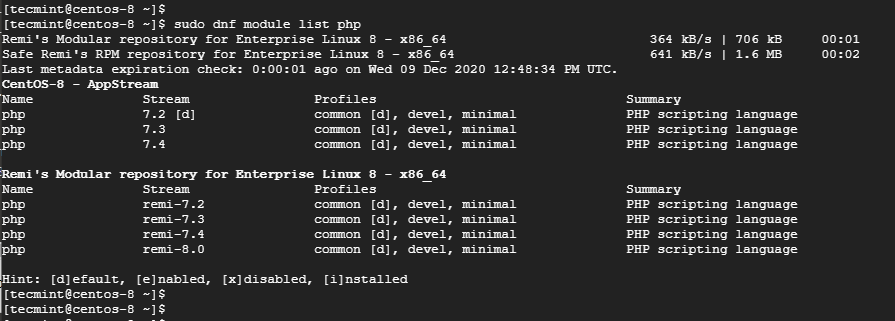
We need to enable this module before installing PHP 8.0. To enable php:remi-8.0, execute:
$ sudo dnf module enable php:remi-8.0 -y [On RHEL 8]

On CentOS 7, use the following commands.
$ sudo yum -y install yum-utils $ sudo yum-config-manager --disable 'remi-php*' $ sudo yum-config-manager --enable remi-php80
Once enabled, install PHP 8.0 for Apache or Nginx web server as shown:
Install PHP 8.0 for Apache
To install PHP 8 on the installed Apache web server, run:
$ sudo dnf install php php-cli php-common

Install PHP 8.0 for Nginx
If you are using Nginx in your development stack, consider installing php-fpm as shown.
$ sudo dnf install php php-cli php-common php-fpm
Step 3: Verify PHP 8.0 on CentOS/RHEL
There are two ways that you can use to verify the PHP version. On command-line, issue the command.
$ php -v

Additionally, you can create a sample php file in the /var/www/html folder as shown:
$ sudo vim /var/www/html/info.php
Then add the following PHP code which will populate the version of PHP alongside installed modules.
<?php phpinfo(); ?>
Save and exit. Be sure to restart the Apache or Nginx web server as shown.
$ sudo systemctl restart httpd $ sudo systemctl restart nginx
Next, head over to your browser and go to the address shown:
http://server-ip/info.php
The webpage displays a wealth of information regarding the version of PHP installed such as build date, build system, Architecture, and a host of PHP extensions.
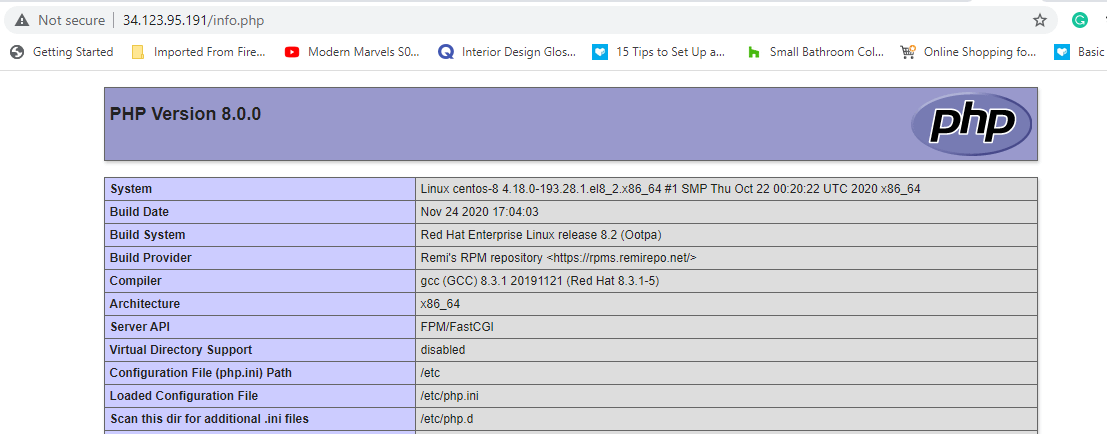
Step 3: Install PHP 8.0 Extensions in CentOS/RHEL
PHP extensions are libraries that provide added functionality to PHP. To install a php extension, use the syntax:
$ sudo yum install php-{extension-name}
For example, to enable PHP to seamlessly work with MySQL, you can install the MySQL extension as shown.
$ sudo yum install php-mysqlnd
Finally, you can verify the installed extensions using the command:
$ php -m
To verify if a specific extension is installed, execute:
$ php -m | grep extension-name
For example:
$ php -m | grep mysqlnd

In the end, we hope that you can now comfortably install PHP 8.0 alongside various php extensions on CentOS/RHEL 8/7.

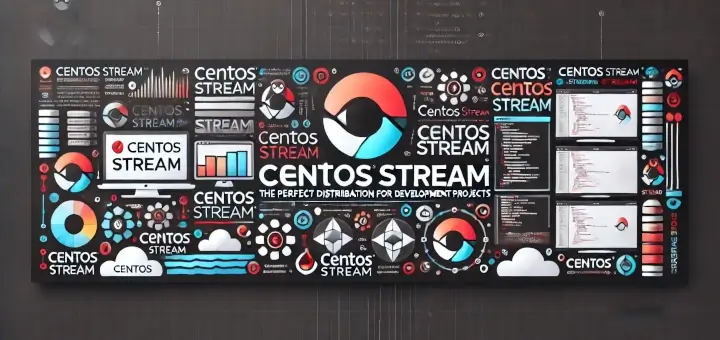
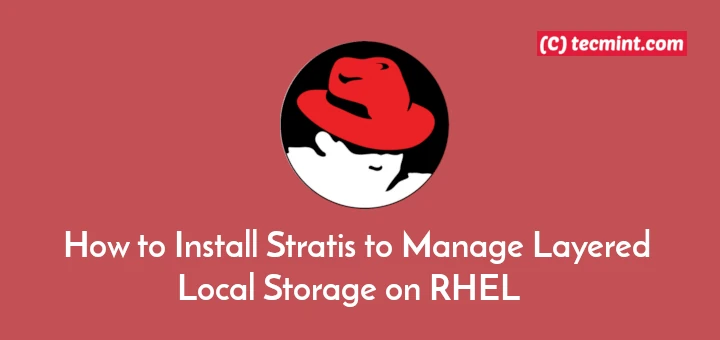
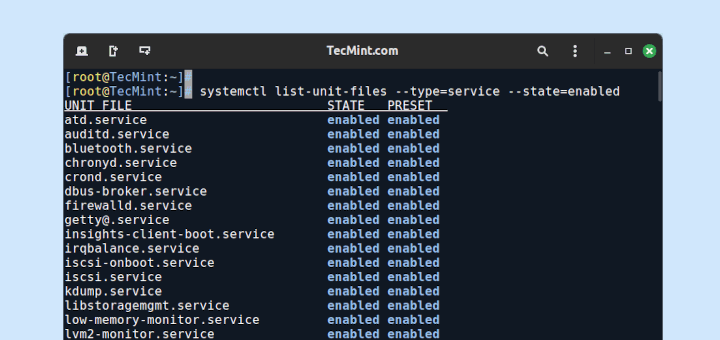

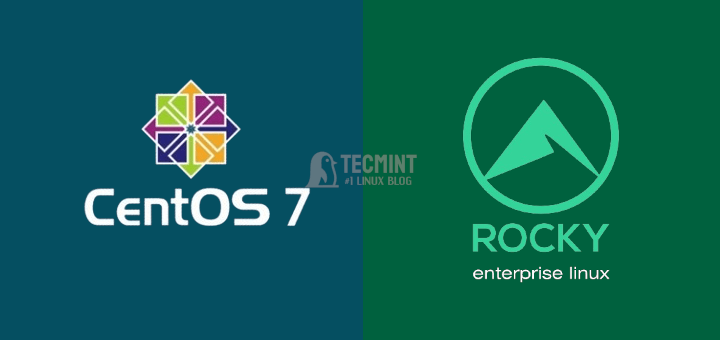
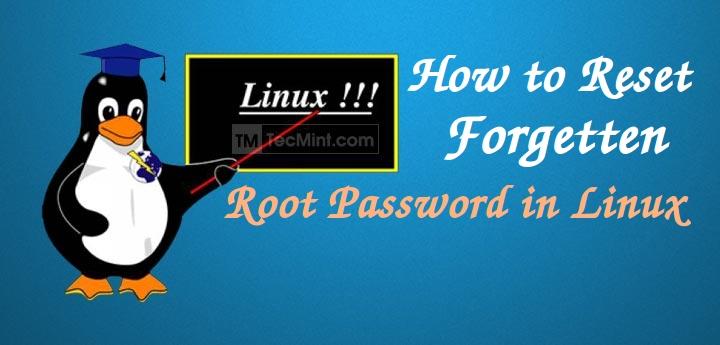
Sometimes it is necessary to reset the php module:
Error: It is not possible to switch enabled streams of a module unless explicitly enabled via the configuration option module_stream_switch.
It is recommended to rather remove all installed content from the module, and reset the module using the ‘dnf module reset‘ command. After you reset the module, you can install the other stream.
Hi,
On my centos 7, I have enabled the php80 repo and tried to update from php74 to php80 and I’m getting the below error, please suggest this.
Error: Package: php-pecl-interbase-1.0.0~DEV.20190523-4.el7.remi.7.4.x86_64 (@remi-php74)
Requires: php(zend-abi) = 20190902-64
Removing: php-common-7.4.30-1.el7.remi.x86_64 (@remi-php74)
php(zend-abi) = 20190902-64
Updated By: php-common-8.0.21-2.el7.remi.x86_64 (remi-php80)
php(zend-abi) = 20200930-64
Available: php-common-8.0.20-1.el7.remi.x86_64 (remi-php80)
php(zend-abi) = 20200930-64
Error: Package: php-enchant-8.0.21-2.el7.remi.x86_64 (remi-php80)
Requires: libenchant-2.so.2()(64bit)
Error: Package: php-pecl-interbase-1.0.0~DEV.20190523-4.el7.remi.7.4.x86_64 (@remi-php74)
Requires: php(api) = 20190902-64
Removing: php-common-7.4.30-1.el7.remi.x86_64 (@remi-php74)
php(api) = 20190902-64
Updated By: php-common-8.0.21-2.el7.remi.x86_64 (remi-php80)
php(api) = 20200930-64
Available: php-common-8.0.20-1.el7.remi.x86_64 (remi-php80)
php(api) = 20200930-64
You could try using –skip-broken to work around the problem
You could try running: rpm -Va –nofiles –nodigest
@Suresh,
I suggest you first remove the installed PHP and its extensions and then re-install the PHP using the php80 repo…
Following the steps on a clean installation of Centos 7, I ended up with PHP 5.4.
FYI your commands only work for RHEL/CentOS 8. There is no dnf or module in yum for RHEL/CentOS 7. This is fine however your title says “How to Install PHP 8 on CentOS/RHEL 8/7” but you’re really only explaining it for 8.
@Alex,
Yes, you are correct, in that case, you need to install PHP 8 with the Yum command as shown.
Also, I have updated the article and included instructions for CentOS 7.
Yeah, it’s worked.
`
sudo dnf module list PHP` needs to be lowercase, should be `sudo dnf module list php`.Hi,
Why does nobody write at the beginning that this guide with Remi repo is not for aarch64?
That’s great. But in the past, I’ve had troubles with some of Remi’s php implementation and always preferred IUS repos versions of PHP. Is there any EL8 appstream version of PHP 8 besides Remi’s?
@Nicalas,
Not yet, but soon PHP 8 will be added to default EL8 repos…
Any references on that ?
No updates yet nor any reference I can give you…
A year later, Remi is still the only source of PHP 8 for Centos/RockyLinux 8.